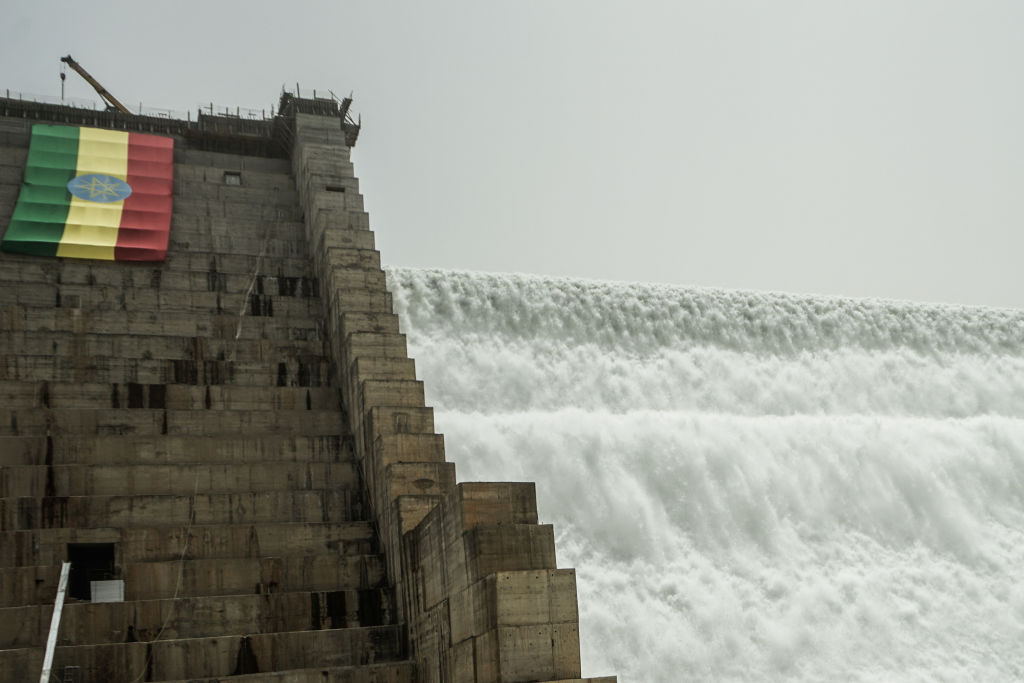ADF STAFF
As it nears completion, the Grand Ethiopian Renaissance Dam continues to fuel tense relations between Ethiopia and Egypt, tensions that go beyond energy or irrigation to the heart of each country’s self-identity, according to analysts.
Ethiopia recently announced that the $4.2 billion dam, also known as the GERD, is 90% complete. Ethiopia finished the third filling of the dam and began generating power in August 2022.
The dam, which is the largest in Africa, straddles the Blue Nile about 45 kilometers from Ethiopia’s border with Sudan. Ethiopia sees the hydropower project as a vital part of the campaign to lift its population out of poverty and to create a unified national identity.
Ethiopia also has said the GERD will benefit its neighbors downstream by controlling seasonal flooding that can inundate Khartoum, where the Blue Nile meets the White Nile (coming north from Lake Victoria) to form the Nile. Neighboring countries also will be able to buy the dam’s excess power.
The view of the GERD is different downstream. Egypt told the United Nations in March that the dam is an existential threat to Egypt and Sudan.
From the moment the project broke ground in 2011, Egypt has repeatedly denounced the dam as a threat to its agricultural sector, which relies on the Nile for irrigation, and to its national security. Egyptian officials say the dam would let Ethiopia choke off the Nile in the event of international conflict.
As recently as mid-March, Egyptian Foreign Minister Sameh Shoukry warned: “All options are open, and all alternatives remain available and Egypt has its capabilities,” according to The East African.
In the past, Egypt hinted at using military strikes to disrupt the construction of the dam. That’s unlikely now, according to Timothy Kaldas, deputy director of the Tahrir Institute for Middle East Policy.
An attack on the dam now would cause destructive flooding downstream in Sudan, an Egyptian ally, Kaldas told DW.
“The window for any possible attack on the dam is closed,” he added.
Caught between Egypt and Ethiopia, Sudan has vacillated in its stance on the GERD. Most recently, Sudanese Finance Minister Gibril Ibrahim told the state-run Ethiopian News Agency (ENA) that the dam will play an important role in the economic growth of the region.
“We think the dam is going to help us have cheap energy from Ethiopia,” Ibrahim told the ENA.
Tensions over the future of the GERD go far beyond the question of power generation or agricultural irrigation, according to Gashaw Ayferam, a researcher at Ethiopia’s Institute of Foreign Affairs.
According to Ayferam, the GERD also created the public perception of the Nile as a driver of Ethiopian development and the foundation of a unifying national identity.
“The river — which was a source of division in the past — is now used by the ruling elite to unify the population under a socially constructed ‘new Ethiopia-ness’ with the GERD at the center,” Ayferam wrote recently for the Carnegie Endowment for International Peace.
Ethiopia says the GERD will generate enough electricity to supply 70% of its 110 million citizens, making it a crucial component of the government’s plan to raise its standard of living. The World Bank ranks Ethiopia as the 23rd-poorest country in the world.
For Egypt, the GERD debate touches on thousands of years of history during which the Nile has played a central role in Egypt’s cultural and national identity, Ayferam wrote.
Egypt’s own Aswan High Dam, which was built between 1960 and 1970, serves a similar purpose as the GERD with the additional role of irrigating vast agricultural lands nearby. The Nile provides 97% of Egypt’s irrigation.
As observers call for the African Union to find a solution to the stalemate, a recent study by researchers at the University of Manchester suggests that the GERD can be a regional benefit for all the countries involved, but only if they are willing to dial back their intense nationalist sentiment.
“The formulation is based on cooperative behavior whereby the riparian countries consider each other’s interests through adaptive measures,” the researchers wrote.
So far, however, none of the countries have reached any agreement over the GERD and the Nile.
“The domestic politics in each of these countries is founded on mistrust, founded on winner textual politics and conflict dominance,” Adam Kassie Abebe, program officer with the International Institute for Democracy and Electoral Assistance, recently told Al-Jazeera. “They have to talk. It’s necessary.”

